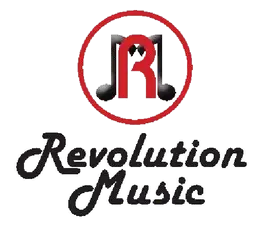FAQ - General / Studio
When you enroll in lessons, you are paying to secure a specific time on a specific day. This is your time that you are paying for as your exclusive time. As such, classes missed for any reason cannot be credited. Students will be responsible for regular attendance during their scheduled lesson time. There will be no credits or refunds for any reason.
Recitals are very rewarding. They provide the student with a goal to work toward. While recitals are meant to be a fun and enjoyable experience, we know there are some people for whom the idea of performing in front of a group is enough to make them quit their instrument. So, while Revolution Music strongly encourages participation in our recitals, it is not required.
We will ask you to pay for the course books that we use during the lesson. If I have extra copies of other music on hand, we will give them to you at no charge.
We do not offer in-home lessons. All of our services are offered at our studio located at:
9121 Wicker Ave., Suite 1
St. John, IN 46373
We are located in the St. John Mall
FAQ - Simply Music Piano
We certainly do teach reading, but we delay the process until the student has developed the confidence and breadth of experience to actually play. If you think about the way we learned our first language, we began by learning to speak and developing a practical grasp of communication before the additional layers of complexity, such as reading and writing, were added. If you remove the complexity of deciphering the code on the page, you will be more free to establish a natural, musical relationship with the instrument and will then be free to focus more fully on sourcing instructions from the page. We simply delay the reading process for a time.
At Revolution Music, we offer Simply Music Piano in both a private or a shared lesson environment. While shared lessons may on the surface seem impractical, the dynamic, interactive format of our lessons actually allows a powerful, effective experience via its application of multi-sensory, receptive and generative learning strategies. At the same time, they are fun and cost-effective and allow students the opportunity to experience playing for and learning from their peers.
Even for beginning students, the best option is to regularly practice on a well-tuned and well-maintained acoustic piano or on a high-quality true digital piano rather than a less expensive keyboard. This helps students establish good habits and understand the real “feel” of piano playing from the very beginning. The Yamaha Arius YDP161 is one great example. Another is the Yamaha Clavinova CLP.
It is possible for beginning students to start on an inexpensive keyboard and then transition to a better instrument as they progress. The keyboard should have at least these features.
- At least 66 full-sized keys, preferably all 88 keys.
- A sustain pedal (not a button), which means the keyboard would need to have legs or sit on.
- A stand so you could sit in front of it and push the pedal with your foot.
- Touch-sensitive keys—it’s louder when you hit the key harder, softer when you hit softer.
- Weighted keys, are not required but much preferred—these feel heavier on the bass notes, and lighter on higher notes.
For Simply Music lessons, the keyboard must meet at least the first three requirements. If it meets all the above requirements, your keyboard will feel more like a real piano, so it will serve the student for their entire training.
